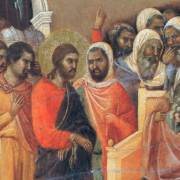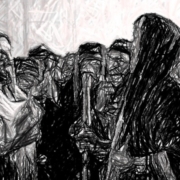A Prophet of God’s Justice: Reclaiming the Political Jesus (Part 2.1)
Chris Marshall | Thursday, 4th June 2015
Read the previous part of this series here.
In the introduction to Part 1.1 of this series, Chris said:
“In this paper I want to offer an appraisal of some of the political themes that emerge in the gospel accounts of the ministry of Jesus. My thesis is radically simple (as well as simply radical) – it is that Jesus was an overtly political figure, that he had an identifiable political platform, and that the political values, commitments and priorities we see displayed in his teaching and praxis ought to play a determinative role in shaping and directing all subsequent Christian engagement in the political process.”
Having argued that "Jesus’ message of the dawning kingdom of God had significant political implications," Chris changes focus in the remainder of this series to discuss the positive dimensions of Jesus' political strategy.
JESUS’ TWO-FOLD POLITICAL STRATEGY
Broadly speaking Jesus’ political stance was characterized by a prophetic denunciation of the injustices and social evils of the prevailing social order on the one hand, including a strident declaration of divine judgment on the existing centres of power responsible for oppression and injustice, and, on the other hand, by the calling together of an alternative community to live according to the standards of God’s kingdom of justice and peace and thereby to model and effect the renewal of Israel as a whole. Commentators often underestimate the potential societal impact that such a “contrast society”, planted in the heart of mainstream society, is capable of. But, as Gerhard Lohfink observes, “the anti-social and corrupt systems of a dominant society cannot be attacked more sharply than by the formation of an anti-society in its midst. Simply through its existence, this new society is a more efficacious attack on the old structures than any program, without personal cost, for the general transformation of the world”.[1]
This twofold strategy of judgment and renewal, of confrontation and reconstruction, of political resistance and social revolution, is evident in at least four major areas of contemporary social life addressed by Jesus.[2] And, to reiterate my underlying thesis, it is the priorities, values and commitments we see at work in Jesus’ activity here that ought to furnish the normative framework for all subsequent political engagement in his name.
1. A rejection of social discrimination: Supremely characteristic of Jesus was his orientation to the social margins—the destitute, the weak, social outcasts, women, children, Samaritans, the physically deformed, those in prison, the sick and the possessed. The dawning of the kingdom of God, insisted Jesus, was good news for the socially disadvantaged.[3] It brought to them both the present comfort of knowing God’s acceptance and blessing despite their social exclusion and often self-blame, and the reassurance that God was now at work, through Jesus and mission, to end their suffering and restore them to freedom and wholeness.
Jesus combated social discrimination at two levels. He openly criticised the self-righteous arrogance of the religious experts,[4] and knowingly antagonized them by seeking intimate fellowship with sinners and outcasts.[5] At the same time, he assembled a new inclusive, egalitarian community in which the poor were to be given preference,[6] the sick and the imprisoned cared for,[7] women accorded dignity and equality,[8] children esteemed as models to be emulated,[9] and Samaritans and Gentiles embraced as equal objects of God’s favour.[10] From this it follows that any modern political programme that marginalises racial, ethnic or social groups, and which ignores or exacerbates the plight of the weak and downtrodden to promote the interests of the strong, even if it calls itself a “Christian” option, is diametrically opposed to the politics of Jesus.
2. A critique of economic exploitation: It is surely impossible to read Luke’s Gospel without sensing Jesus’ profound hostility to materialism and the relational and societal damage it causes. As an alternative source of security, the pursuit and hording of surplus wealth creates a barrier to radical trust in God and his kingdom.[11] Moreover, in a patronage-based economy the concentration of massive riches in the hands of a few was evidence of structural injustice in society. The rich prospered at the expense of the poor. Jesus’ words “for you always have the poor with you” should not be taken as a sign of his passive acquiescence to poverty in society.[12] They are, in fact, an implied rebuke, for according to Deuteronomy 15:11 enduring poverty was evidence of a failure to keep the laws of the covenant by practicing mutual sharing and collective responsibility.
Jesus’ use of the intriguing term “mammon of injustice” (Luke 16:9) may even imply that he saw in the single-minded pursuit of wealth an inherent tendency towards injustice. This is confirmed in his overt attack on the greedy rich of his day. “Woe to you who are rich now, for you have received your consolation. Woe to you who are full now, for you shall hunger” (Luke 6:24-25). Jesus criticised the rich for three related evils: for accumulating unneeded surplus,[13] for ignoring the needs of the poor,[14] and for corruption and exploitation of the weak.[15] It is in this connection that we should probably understand Jesus’ climactic confrontation with the Temple establishment—which was undoubtedly his most overt and daring political-prophetic action.[16] There is no time to explore this extremely important episode here, but it was probably the way the Temple system had become integrated into the imperial system of domination and exploitation that Jesus most strongly objected to.[17]
By contrast, Jesus pronounced beatitude upon the poor. “Blessed are you poor, for yours is the kingdom of God. Blessed are you who hunger, for you shall be full. Blessed are you who weep, for you shall laugh” (Luke 6:20-21).[18] Jesus is not here turning poverty, hunger and tears into “spiritual values” in themselves. The poor, the starving and the sorrowful are not blessed because of their condition but because God intends to reverse their situation. When God’s kingdom comes in its fullness, poverty and pain will be no more. In the meantime, God’s kingly power is at work in Jesus and his followers to bring healing and liberation and to create a new community to work against poverty, hunger and misery. Thus, as Klaus Wengst observes:
…the beatitudes prove also to be declarations of war against poverty, hunger and tears: they are concerned for radical change. They look to the coming kingdom of God for this change ... But this expectation is not just to be waited for; it has a reality in behaviour to match. When Jesus turns to those on the periphery, in his fellowship with his followers, people are already filled, already laugh, who would otherwise be pushed aside and have nothing to laugh about ... the hungry are filled and ... the domination of one person by another has come to an end.[19]
Not only were the poor and hungry to find dignity and acceptance within the new community, but a whole new attitude to material possessions was to prevail therein. Following Jesus entailed a commitment to share one’s material resources with those in need.[20] A lifestyle of simplicity,[21] material dependence[22] and constant vigilance against the “deceitfulness of riches” (Mark 4:19) are to be the hallmarks of the new community. In these ways, Jesus’ followers were to live ‘as if’ the provisions of the biblical Jubilee were being enacted in their midst.[23]
How very different is the prevailing political landscape of global capitalist society today, which makes an idol of market forces, promotes consumerism as a means of political survival, and, while mouthing platitudes to the contrary, exacerbates the plight of the poor and dispossessed in pursuit of an ever-greater concentration of wealth and power.
Read the final instalment in this series here. This article originally appeared in On The Road 32.
[1] G. Lohfink, Jesus and Community: The Social Dimension of Christian Faith (London: SPCK, 1985), 95. So also John Howard Yoder, The Politics of Jesus (Grand Rapids: Eerdmans, 1994), 40.
[2] For the section that follows, see, more briefly, my Little Book of Biblical Justice (Intercourse: Good Books, 2004), 49–64. No attempt will be made to assess the authenticity of the various sayings ascribed to Jesus, nor to delineate the redactional interests of the individual evangelists. The themes reviewed here are sufficiently pervasive in the gospel traditions to be confident that they substantially reflect the perspective of Jesus, even allowing for sometimes extensive redactional shaping of the materials by the gospel writers.
[3] Luke 4:18–20; Matt 11:2–6/Luke 7:18–35.
[4] See e.g. Matt 9:13; 21:31; Luke 6:24f; 16:15.
[5] See e.g. Mark 2:15–17/Matt 9:10–13/Lk 5:27–30; Matt 11:19/Luke 15:1–2; 19:1–10.
[6] See e.g. Luke 14:12–24.
[7] Matt 25:31–46
[8] See e.g. Luke 8:1–3; 10:38–42; Mark 14:3–9; 15:40–41; John 3:7–38, etc.
[9] Mark 9:36,42/Matt 18:1–5/Luke 9:46–48; Mark 10:13–16/Matt 19:13–15/Luke 18:15–17.
[10] See e.g. Mark 7:24–30/Matt 15:21–28; Mark 11:17; 13:10; Matt 8:5–13/Luke 7:1–10; Matt 12:18; 21:43/Luke 20:16; Matt 28:19–20; Luke 9:51–55; John 4:7–42.
[11] Mark 4:19/Matt 13:22/Luke 8:14; Mark 10:17–31/Matt 19:16–30/Luke 18:18–30; Matt 6:21; Luke 12:16–21; 14:1–14; 16:13.
[12] Mark 14:7/Matt 26:11/John 12:8.
[13] Luke 12:15–21; 16:19; 21:1–4; Matt 11:8.
[14] Luke 10:25–37; 16:19–27.
[15] Mark 11:15–19; 12:40/Luke 20:47; Matt 23:23/Luke 11:42.
[16] Mark 11:15–18/Matt 21:12–13/Luke 19:45–46; John 2:14–22.
[17] The literature on this episode is now substantial, but see especially Herzog, Jesus Justice, 112–43, 191–99.
[18] On this see my essay “The Moral Vision of the Beatitudes: The Blessings of Revolution”, in Faith and Freedom: Christian Ethics in a Pluralist Culture (eds. D. Neville & P. Matthews; Sydney: Australian Theological Forum, 2003), 11–33.
[19] Klaus Wengst, Pax Romana and the Peace of Christ (London: SCM, 1987), 65.
[20] See e.g. Mark 10:17–30; Matt 6:2–4; Matt 7:7–11; Luke 6:35, 38; 8:1–3; 12:32–34; 19:1–10; 14:25–35; John 12:6; 13:29.
[21] Matt 6:19–34/Luke 12:22–31.
[22] Mark 6:7–13, cf. Luke 9:38; 10:4.
[23] Wright, Jesus and Victory, 295.
Prof Christopher Marshall is the Diana Unwin Chair in Restorative Justice in the School of Government at Victoria University in Wellington, New Zealand. He specialises in New Testament theology and ethics, peace theology and practice, and restorative justice (both theory and practice), and is an expert in the study of contemporary Anabaptist theology. His books include Beyond Retribution: A New Testament Vision for Justice, Crime and Punishment and Compassionate Justice: An Interdisiciplinary Dialogue with Two Gospel Parables on Law, Crime, and Restorative Justice.










